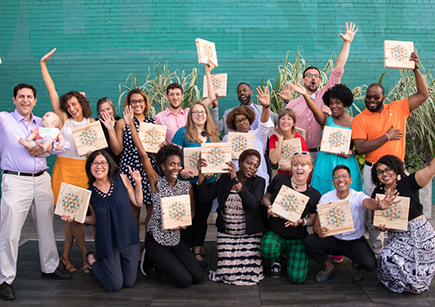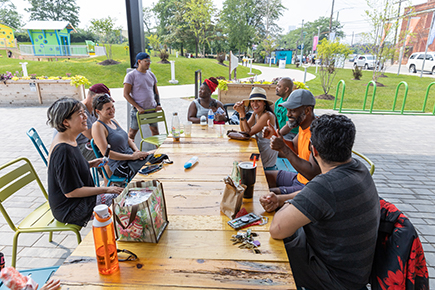Detroit Revitalization Fellows celebrates a decade of impact, plans for the future

In 2011, when Detroit was in the midst of the foreclosure crisis and on the verge of bankruptcy, Wayne State launched a visionary program to bring—and keep—talented professionals here in the city. The Detroit Revitalization Fellows celebrates its 10th anniversary this year. And while its work will look a bit different over the next decade, its mission to strengthen Detroit, its leaders and their organizations remains the same.
Modeled after a similar program created in New Orleans after Hurricane Katrina, DRF was launched by the Office of Educational Outreach and International Programs. Nearly 650 professionals from across the U.S. applied for the first cohort, and 29 were selected, coming from as far away as Europe and as close as Wayne State’s campus. Each fellow assumed full-time, two-year positions with civic, community and economic development organizations and took part in intensive leadership training and cohort-building. Led today by the Office of Economic Development, DRF has hosted 80 fellows over four cohorts, including six at Wayne State and its affiliated business support organization, TechTown.
Those fellows have played key roles in launching some of the city’s most visible and high-impact projects of the last decade, including Motor City Mapping, REVOLVE Detroit (which grew into Motor City Match), the East Jefferson Corridor Project, Eastern Market’s Sunday Market, the Detroit Public Lighting Authority and the Detroit ’67 Project. Many of these projects have become a part of the fabric of the city and more than 75 percent of the fellows continue to live and work in Detroit and the region. DRF alumni can be found in leadership positions in the Detroit Mayor’s Office, Bedrock Real Estate, BUILD Institute, Co.Act Detroit, Detroit Future City, Community Development Advocates of Detroit, Detroit Economic Growth Corporation, Invest Detroit and Ford Land, the entity responsible for Ford Motor Company’s redevelopment of Michigan Central Station, among others. Two DRF alums currently work for Wayne State and TechTown. Emily Thompson, director of economic and community development in the Office of Economic Development, led the transformation of Woodward | Warren Park as a Fellow and also recently led a new initiative offering free Dart and MoGo transit passes to all WSU students. Amy Rencher, TechTown’s managing director of entrepreneurial programs and services, spearheaded the Detroit and TechTown Small Business Stabilization Funds, which raised $1.2 million for grants to Detroit, Highland Park and Hamtramck small businesses at the onset of COVID-19.
Detroit has changed dramatically over the last 10 years, and DRF is evolving too. After an intensive strategic planning period focused on equity and inclusion, DRF plans to launch its first Community & Resident Leadership Cohort in 2022. This program will provide the leadership and cohort-building experiences for which DRF has become known to grassroots community leaders, while building the capacity of neighborhood-based organizations.
“DRF’s evolution mirrors a much-needed shift across Detroit as a whole. We’re looking to disrupt the leadership culture,” says DRF interim director Latina Black. “Leadership has often looked to the highest ranks for solutions to our challenges. But we know that a truly sustainable and equitable future for our city must honor the talent, leadership and insight of those who have been working directly in their communities for decades.”

Investing in community leaders will boost neighborhood capacity, which directly supports Wayne State’s strategic goal to enhance our leadership in the revitalization of Detroit. “True revitalization occurs when you invest in leaders on the ground and give them a seat at the decision making table,” Black observes. DRF will also explore ways to offer its leadership training to the broader community and invest even more deeply in its alumni.
Vice President for Economic Development Ned Staebler has guided the growth of DRF since it became a part of the Office of Economic Development in 2012. “I’m tremendously proud of the role Detroit Revitalization Fellows has played in changing the narrative about the immense potential and resilience of the people and community organizations of Detroit,” Staebler says. “I’m grateful to Ahmad Ezzedine, Robin Boyle, Jeff Stoltman, DRF’s former program manager and directors—Rachele Downs, Graig Donnelly and Asandi Conner—as well as our funders and everyone else who developed and ran with the vision for this program and helped it become what it is today.”
For more information on Detroit Revitalization Fellows, visit detroitfellows.wayne.edu.